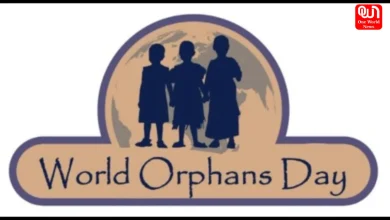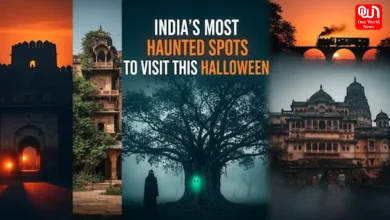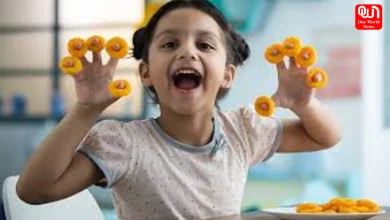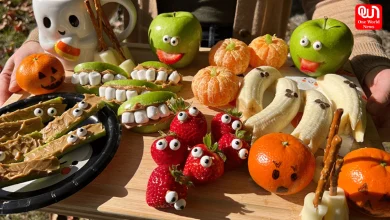From Gujiya to Thandai: History of 3 Holi Special Sweets

History of Holi Special Sweets and how these sweets make this festival special
Holi is clearly the most awaited festival of the year. It is when we all leave behind old memories and broken relationships and enjoy this beautiful bonding with colours and joy. This year Holi will be celebrated on 8th March. Many things make Holi special. Colours, family bonding, and sweets are a vital part of the Holi celebration. Be it Ghujiya or Thandai, here is a brief history of Holi special sweets.
Read More- Make Their Holi Happier with These 14 Holi Wishes
People desperately wait for the joyous occasion of Holi to be with their loved ones and shower them with gulaal. However, we should still maintain safety and ensure no harm to our as well as others’ health. Therefore, keeping up with the festival’s spirit and our protection, we have curated a list of Holi special sweets you can easily prepare at home or purchase from your favourite sweet shop, invite friends and family, and have a blast.
1. Gujiya
It is only possible to imagine Holi with the sight of these sweets at every mithai shop. The streets are filled with the aroma of the gujiyas, stuffed with rich khoya or mawa, getting fried in ghee. The crispy and syrupy flavour of gujiya with fillings that taste like heaven is necessary on this occasion.
History of Gujia
The half-moon-shaped sweet that guarantees delight in every bite you take has a mixed origin. The popular belief is that it came to Rajasthan from Uttar Pradesh. It belongs to the Bundelkhand region in the North, comprising Madhya Pradesh, Rajasthan, and Uttar Pradesh.
Some say that it is inspired by Baklava, a sweet pastry from Turkey, as it is also sweetened with syrup and has a crusty flour covering.
Read More- From The Most Popular To The Least Known, We Have Picked 6 Best Places To Celebrate Holi In India
However, like every food item, the localisation process plays an important role. The fillings, the name, and the process vary slightly in different areas, but as Shakespeare puts it, “A rose by any other name would smell as sweet.”
Here is the recipe for this mouth-watering.
We went extra mile and found many places in Delhi that serve the best Ghujia. Here is a list-
· Kanwarji
Located in the heart of Chandni Chowk, this 1850 shop is the best place for many sweets and snacks.
· China Ram Sindhi Confectioners
Located in Chandni Chowk, this place is a popular choice for many as it is one of the oldest shops serving some quality and yummy items.
· Haldiram’s
Haldiram’s offers a different take on the traditional sweet by giving you the Kesar, Maida, Coconut, and various varieties.
· Gulab
Located in Pitampura, this sweet shop is one of the best places in East Delhi to get some good Gujiyas and other sweets.
· Tewari Sweets
In the market of Lajpat Nagar, this sweet shop attracts many due to its unique sweets, and you have to try their Gujiyas.
Kadimi Sweets
One of the oldest sweet shops of South Delhi. Their ‘ghar jaisi gujiya’ is a must try as it reminds one of the taste of gunjiya prepared at home by our grandmothers.
2. Thandai
It is no surprise that summer is already upon us. The answer to this is the sweet-spicy thandai that forms an integral part of the Holi celebration. Thandai is a traditional drink that is made using dry fruits, some seeds, and spices in milk.
History of Thandai
Thandai is one of the oldest drinks of the country. The first record of it dates back to as old as 1000 BC! Thandai mixed with Bhang has also been a popular drink that was served to Lord Shiva. The cultural significance of Bhang and thandai is important for Shivratri and Holi.
Here is the recipe-
3. Malpua
Malpua is a paradise for ghee lovers. It is the Indian version of pancakes- a lot sweeter and fried! It is usually served with rabdi or condensed milk with dry fruits on top.
History of Malpua
The mention of Malpua dates back to the Vedic times. Several Vedic scriptures have mentioned “apupa,” believed to be the origin of Malpua. It is popular in Northern and Eastern India. In addition, it is a breakfast item that is served to Lord Jagannath in Odisha.
Here is the recipe for you-
Considering that Holi is a festival that is purely meant for eating, feasting, and letting go- we suggest that you go wild and enjoy it to the fullest.
Considering that Holi is a festival purely meant for eating, feasting, and letting go, we suggest you go wild and enjoy it to the fullest.
Liked this post?
Register at One World News to never miss out on videos, celeb interviews, and best reads.







